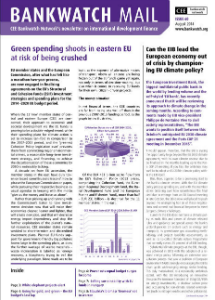EU funds continue to do their bit for the promotion of sustainable living in Hungary

Bankwatch Mail | 8 August 2014
Whether at the global level with the United Nations Framework of Programmes on Sustainable Consumption and Production, the European level with the Environment Action Programme to 2020, or at the national level, a great deal of effort is being made to promote, develop and expand sustainable lifestyles and production. Such efforts should be tailor-made for receiving financial support from the EU funds.
This article is from Issue 60 of our quarterly newsletter Bankwatch Mail
Browse all articles on the right
In Hungary, building on previous experience, this opportunity is being seized. Both in the previous 2007-2013 EU budgetary period and now – it would appear – in a modified way in the forthcoming 2014-2020 period, the Hungarian government is opting to finance communication projects via EU money that promote sustainable lifestyle and consumption patterns.
Prior to 2007, following a successful campaign by NGOs and thanks also to open-minded officials, ‘Promotion of sustainable lifestyle and consumption’ became a separate priority in the Hungarian Environment and Energy Operational Program for 2007-2013. While not fully equipped to solve the underlying problem that, in the previous seven year period, the majority of EU financed programs flouted the principles of sustainable living, the inclusion of this ‘promotion’ priority was nonetheless viewed as a small step forward.
The aim of the priority indeed was to help make sustainability a generally accepted way of living, to make more widely known ways of applying sustainable alternatives as well as the environmental consequences of consumption, and to improve the availability of sustainable consumption alternatives via cooperation between different groups in society – for instance, between businesses, NGOs, the education and scientific sectors, consultants and the public.
For the 2007-2013 period, 77 million euros was duly allocated for campaigns that would present both the environmental and social impacts of consumption and the benefits of sustainable living, especially in the following areas:
- Raising awareness about the benefits of sustainable consumption, including disseminating and clarifying the values of sustainability in order to make its benefits comprehensible at a personal level.
- Promoting the acceptance of sustainability as a social norm.
- Facilitating access to sustainable infrastructure alternatives, and increasing awareness about possible uses for such infrastructure alternatives.
Although difficult to precisely quantify the results of the campaigns that took place, it was evident that NGOs, local and national authorities as well as companies implemented several successful nationwide projects that reached millions of people living in Hungary. According to a Eurobarometer survey, environmental awareness among the Hungarian population increased from 41 percent in 2007 to 55 percent in 2011.
This looks set to continue into the new programming period, though in a slightly different form (and with precise budgetary sums not yet clearly defined). The Environment and Energy Efficiency Operational Programme includes separate awareness-raising programmes for different priorities as follows:
- Comprehensive climate change mitigation and adaptation awareness-raising campaigns.
- Campaigns aimed at water use, and water-saving demonstration projects.
- The promotion of selective waste collection, re-use and recycling.
- Awareness-raising activities related to the national Natura 2000 network and the preservation of certain protected species.
- Increasing energy awareness, energy efficiency, and the use of renewables through the implementation of complex awareness-raising programs.
Issues remain, however, as the programming details are currently being thrashed out. Communication experts like to have clear, simple messages and well-defined, target audiences. A shortcoming of the new plans in their current form is that the awareness raising programs are divided into sectors, and are thus likely to hinder the raising of awareness in a holistic sense, where all the major problems of unsustainable living are seen and understood in the round.
There is still time, though, to address these shortcomings in the next few months, and formulate thoroughgoing sustainable living campaigns that will help make a difference in Hungary for the next seven years, and well into the future.
Location: Hungary
Tags: BW Mail 60 | EU funds | awareness raising
Never miss an update
We expose the risks of international public finance and bring critical updates from the ground. We believe that the billions of public money should work for people and the environment.
STAY INFORMED
